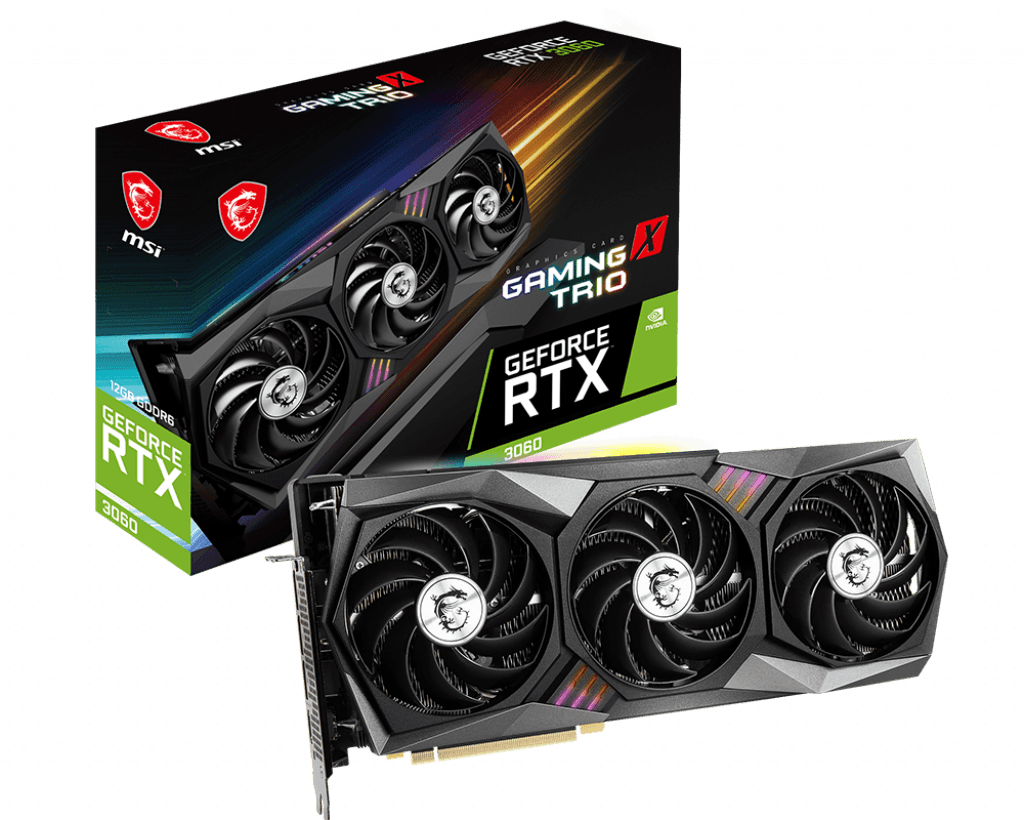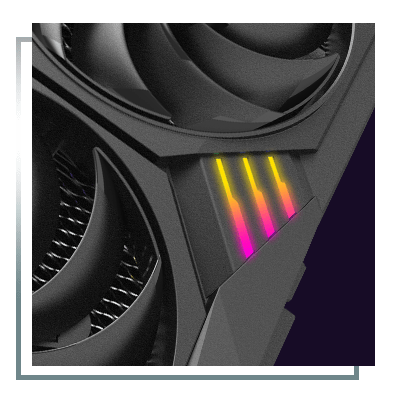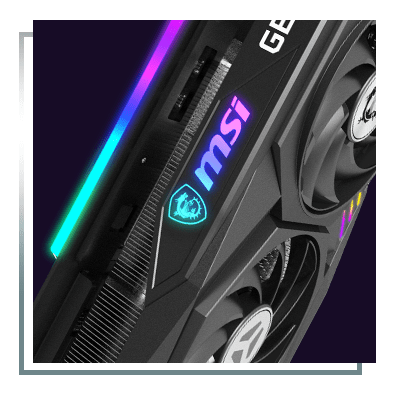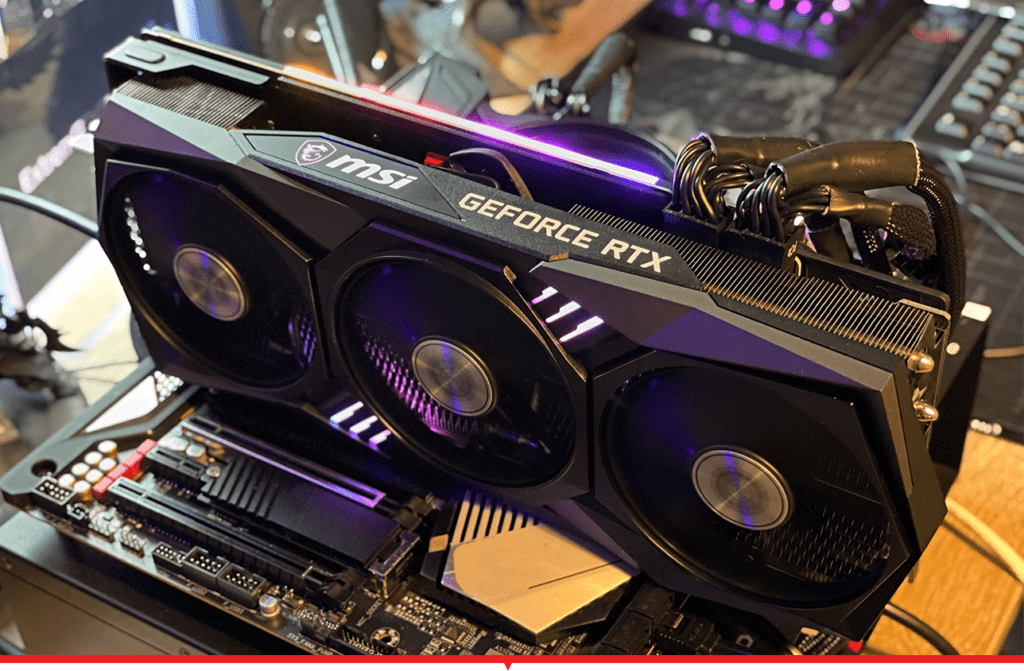For the first time in my life, I get to write a review of a gold ingot. Well, almost… We have recently received the GeForce RTX 3060 Gaming X Trio from MSI. Taken into consideration how limited the stock on RTX graphics cards is right now, the reality is not too far from my golden bar joke.
The GeForce RTX 3060 Gaming X Trio is the successor of GTX 1060, which was a really popular mid-range graphics card. RTX 3060 comes with many upgrades like real-time ray tracing, DLSS, NVIDIA Reflex, NVIDIA Broadcast, VRAM of 12GB GDDR6, and the 360GB/sec memory bandwidth. Sounds like a 1060 on steroids. The truth is, RTX 3060 offers way more and we will analyze everything in this review.
Design
The RTX 3060 Gaming X Trio follows the classic triple fans aggressive design (that’s where the Trio comes from) and 2.5 slot cooler. There are some beautiful and detailed RGB touch-ups on this card.
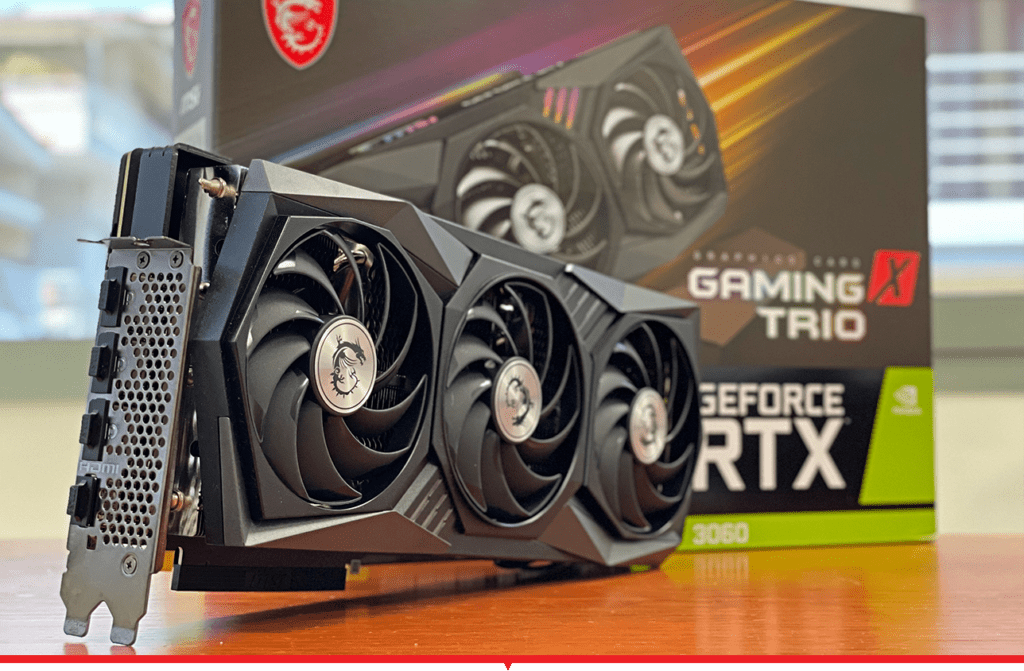
Unboxing
Opening the box, we have the RTX 3060 graphics card, a stability bracket, and the manuals. The stability bracket is a really nice inclusion from MSI, since this specific card is pretty large and heavy.
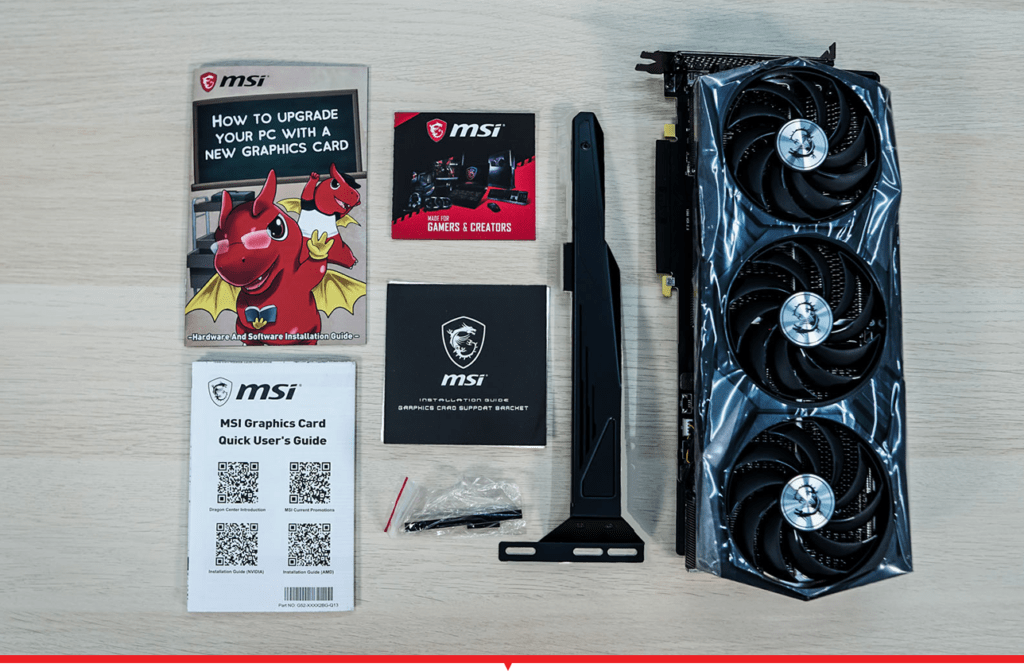
Overview
The size of the card is pretty big, with dimensions of 323 x 140 x 56 mm and weighs in at 1477g. This means it’s pretty much the same size as the RTX 3080 Gaming X Trio.
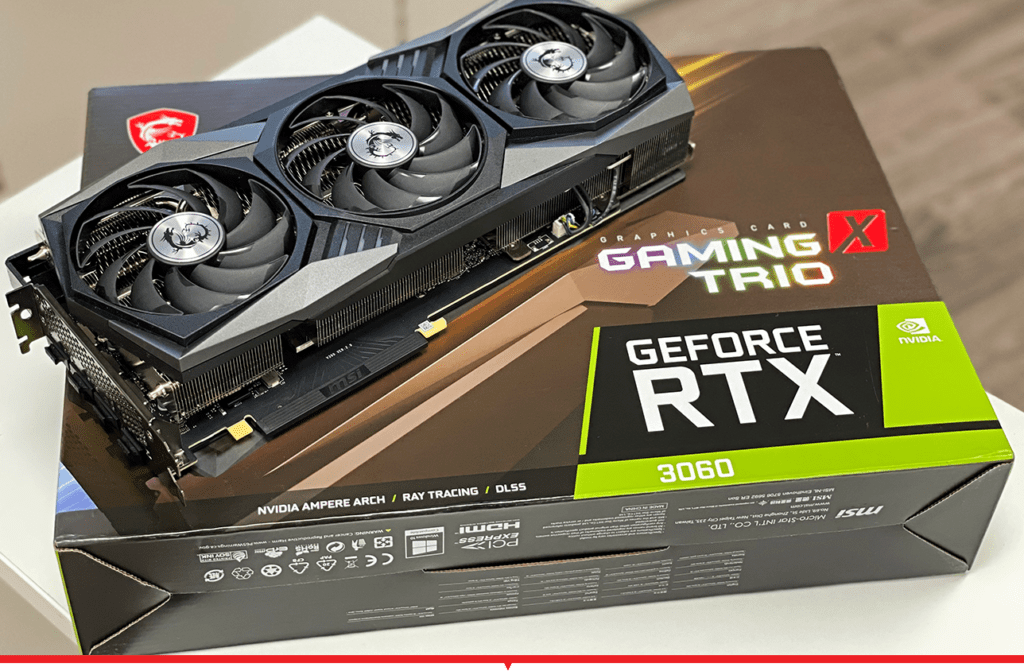
Cooling system
The first thing you notice is the cooling system: MSI’s TRI FROZR 2.0. It features a large black shroud, three cooling fans, and a triple heat-sink array. The fans here are the new Torx 4.0 fans, which feature a new design. The blades come in pairs. These pairs are bound together with an outer ring design link, which focuses airflow into the updated TRI FROZR 2 cooling system. These new fans provide more air pressure and with the Airflow Control the air-heads exactly where it needs to, for maximum cooling. The fans also use the FROZR technology. This keeps the fans still and maintains noise at a minimum until extra cooling power is needed.
What is different compared to the RTX 3080 though, is the design of the heat-sink. Three heat-sinks are visible from the side of the card and all three of them are connected by heat pipes.
It’s all about the lines
On the other side, there is an MSI logo, a long strip, and a set of accent lights around the center fan. All of them will light up with RGB lighting when you have your system turned on. Of course, the GeForce RTX logo is there, on the top edge of the card. The lighting effects can be customized using the Mystic Light software, helping you match it to the rest of your computer’s RGB. Of course, if you are not an RGB fan, you can easily disable all the lighting for less distraction.
Towards the end of the card, we have our power connections which are two 8-pin PCI-Express power connections. In total honesty, I would prefer to have a single 8pin PCIe.
On the backside, we have a full-cover backplate with the MSI logo and the GEFORCE RTX logos. The backplate is made out of graphene. Graphene is a lightweight composite that reinforces the length of the graphics card while providing passive thermal conduction.
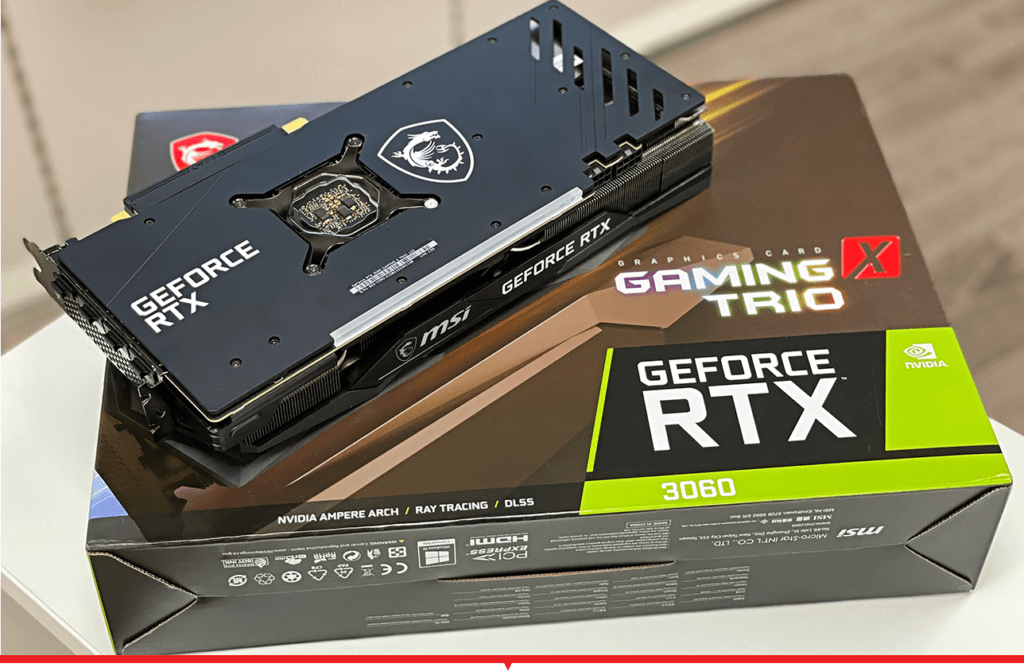
On the display outputs’ side, we have three DisplayPort 1.4 and a single HDMI 2.1. You may notice that the card is pretty thick and will need more than two slots. Be extra careful when choosing a case for a build with this card.

Functionality
Benchmarking
We tested the GeForce RTX 3060 Gaming X Trio on Overchilled‘s benchmark system:
- CPU: i9 10900k
- RAM: Trident Gskill 3200 16GB
- NVME: Samsung 980 EVO 1tb
- PSU: Corsair 1200 hx1200
Let’s first check the overview and the speeds of the card through GPU-Z.
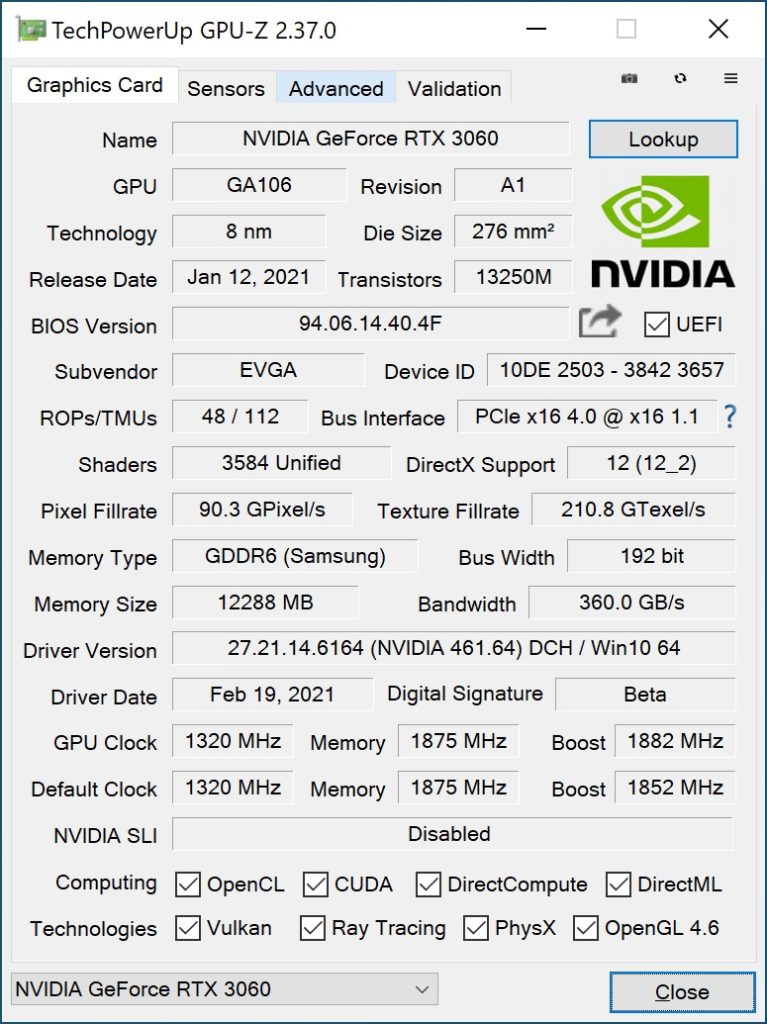
Our synthetic tests started with Fire Strike. Please note that all the tests were done on stock settings.
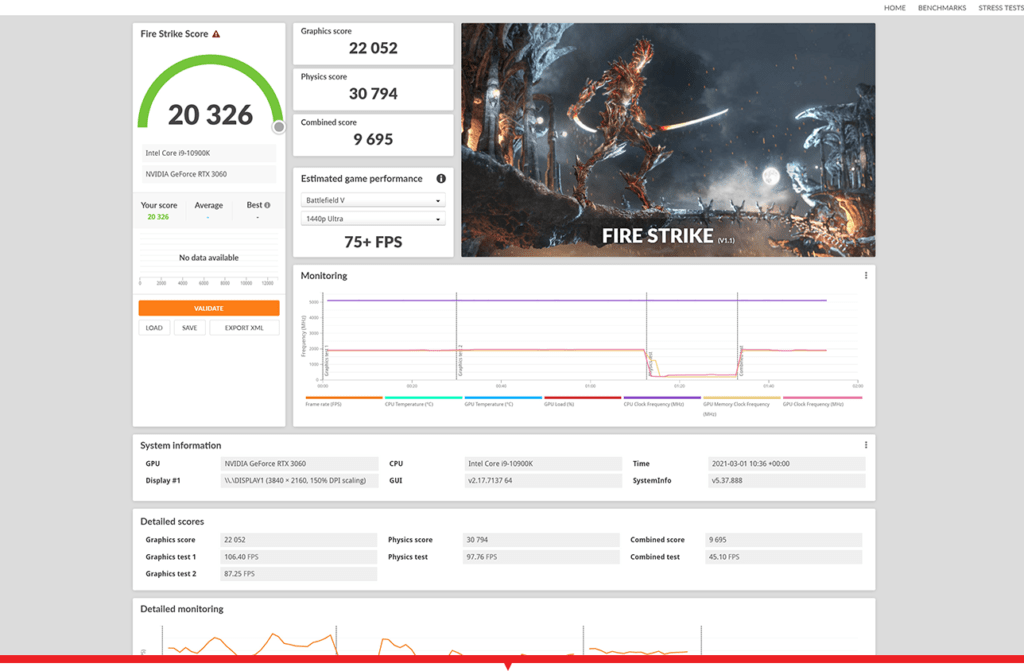
Then, we continued on with Super Position.
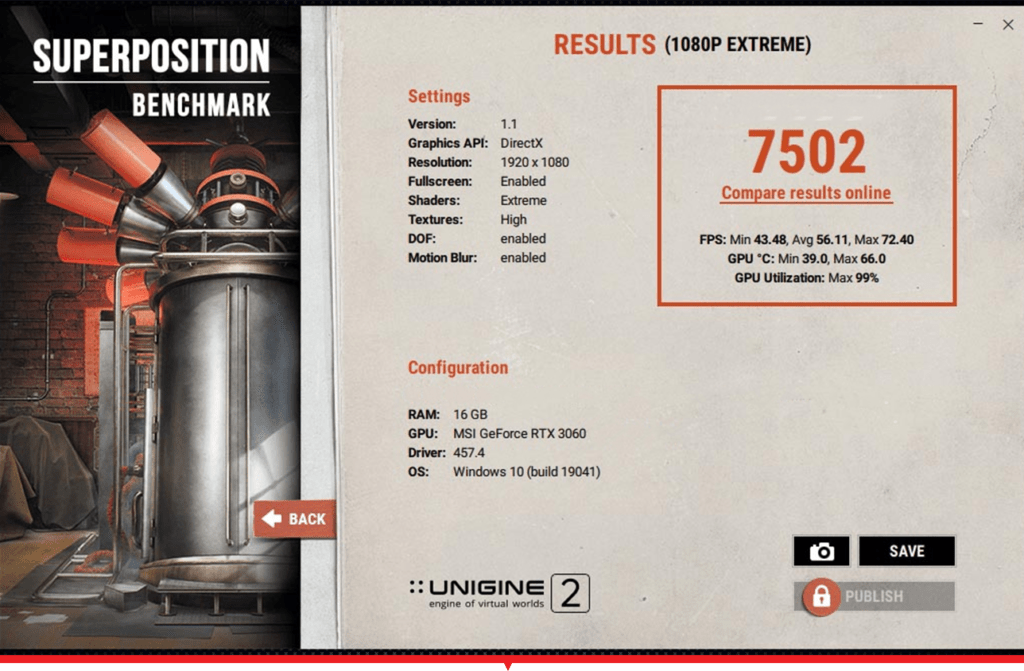
And finally, the results we got from Time Spy.
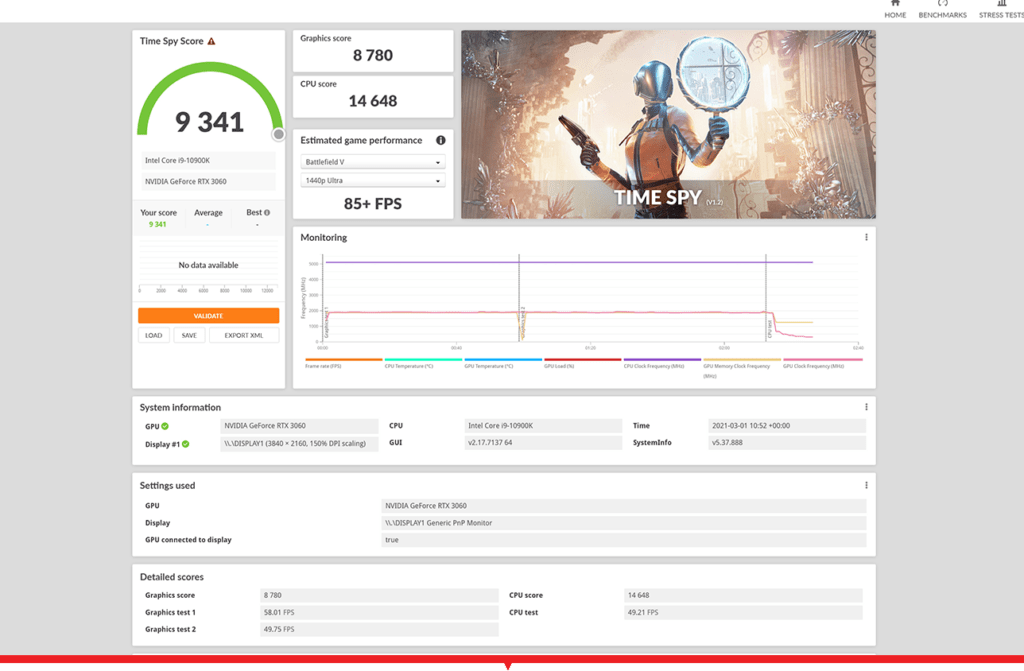
For our gaming tests, we tried Assassin’s Creed Valhalla and Metro Exodus on 1080p, 1440p, and 4k. Both games were set on Ultra graphics settings.

| Graphics Cards | Average FPS |
| Radeon RX 6800 (16GB) | 100 |
| Radeon RX 5700 XT (8GB) | 91 |
| GeForce RTX 3080 (10GB) | 85 |
| GeForce RTX 3070 (8GB) | 77 |
| Sapphire RX 5600 XT Pulse (6GB) | 76 |
| GeForce RTX 3060 Ti (8GB) | 75 |
| GeForce RTX 2080 Ti (11GB) | 74 |
| GeForce RTX 2080 (8GB) | 70 |
| GeForce RTX 2070 (8GB) | 69 |
| MSI RTX 3060 Gaming X Trio (overclocked) | 67 |
| GeForce GTX 1080 Ti (11GB) | 65 |
| MSI RTX 3060 Gaming X Trio stock | 64 |
| GeForce RTX 2060 (6GB) | 61 |
| GeForce GTX 1080 (8GB) | 55 |
The MSI RTX 3060 Gaming X Trio is at the same levels as the GeForce GTX 1080 Ti.
| Graphics Cards | Average FPS |
| Radeon RX 6800 (16GB) | 80 |
| GeForce RTX 3080 (10GB) | 73 |
| Radeon RX 5700 XT (8GB) | 68 |
| GeForce RTX 3070 (8GB) | 66 |
| GeForce RTX 3060 Ti (8GB) | 62 |
| GeForce RTX 2080 Ti (11GB) | 62 |
| GeForce RTX 2080 (8GB) | 57 |
| Sapphire RX 5600 XT Pulse (6GB) | 57 |
| GeForce RTX 2070 (8GB) | 56 |
| MSI RTX 3060 Gaming X Trio (overclocked) | 54 |
| GeForce GTX 1080 Ti (11GB) | 51 |
| MSI RTX 3060 Gaming X Trio stock | 50 |
| GeForce RTX 2060 (6GB) | 47 |
| GeForce GTX 1080 (8GB) | 45 |
Even on 1440p, it does better than the GTX 1080 Ti.
| Graphics Cards | Average FPS |
| GeForce RTX 3080 (10GB) | 52 |
| Radeon RX 6800 (16GB) | 51 |
| GeForce RTX 3070 (8GB) | 43 |
| GeForce RTX 2080 Ti (11GB) | 43 |
| GeForce RTX 3060 Ti (8GB) | 41 |
| Radeon RX 5700 XT (8GB) | 38 |
| GeForce RTX 2080 (8GB) | 37 |
| GeForce RTX 2070 (8GB) | 35 |
| MSI RTX 3060 Gaming X Trio (overclocked) | 35 |
| GeForce GTX 1080 Ti (11GB) | 32 |
| MSI RTX 3060 Gaming X Trio stock | 30 |
| GeForce RTX 2060 (6GB) | 28 |
| GeForce GTX 1080 (8GB) | 26 |
| Sapphire RX 5600 XT Pulse (6GB) | 25 |
For a freshly released game like Valhalla on 4K resolution, the MSI RTX 3060 Gaming X Trio is doing a great job holding an average of 30 to 35 FPS. Great results overall. It delivered even more than I initially expected.

| Graphics Cards | Average FPS |
| GeForce RTX 3080 (10GB) | 90 |
| Radeon RX 6800 (16GB) | 76 |
| GeForce RTX 2080 Ti (11GB) | 76 |
| GeForce RTX 3070 (8GB) | 73 |
| GeForce RTX 3060 Ti (8GB) | 64 |
| GeForce RTX 2080 (8GB) | 61 |
| GeForce GTX 1080 Ti (11GB) | 55 |
| Radeon RX 5700 XT (8GB) | 53 |
| MSI RTX 3060 Gaming X Trio (overclocked) | 50 |
| GeForce RTX 2070 (8GB) | 48 |
| MSI RTX 3060 Gaming X Trio stock | 47 |
| Sapphire RX 5600 XT Pulse (6GB) | 45 |
| GeForce GTX 1080 (8GB) | 43 |
| GeForce RTX 2060 (6GB) | 41 |
While we were enjoying our Metro Exodus game on 1080p, the MSI RTX 3060 Gaming X Trio was even doing better than the RTX 2070.
| Graphics Cards | Average FPS |
| GeForce RTX 3080 (10GB) | 77 |
| Radeon RX 6800 (16GB) | 65 |
| GeForce RTX 2080 Ti (11GB) | 63 |
| GeForce RTX 3070 (8GB) | 60 |
| GeForce RTX 3060 Ti (8GB) | 53 |
| GeForce RTX 2080 (8GB) | 53 |
| GeForce GTX 1080 Ti (11GB) | 46 |
| Radeon RX 5700 XT (8GB) | 43 |
| MSI RTX 3060 Gaming X Trio (overclocked) | 42 |
| GeForce RTX 2070 (8GB) | 39 |
| MSI RTX 3060 Gaming X Trio stock | 39 |
| Sapphire RX 5600 XT Pulse (6GB) | 37 |
| GeForce GTX 1080 (8GB) | 35 |
| GeForce RTX 2060 (6GB) | 34 |
On 1440p in Metro Exodus, the average FPS were lower than 1080 Ti, but still not far behind.
| Graphics Cards | Average FPS |
| GeForce RTX 3080 (10GB) | 54 |
| Radeon RX 6800 (16GB) | 44 |
| GeForce RTX 2080 Ti (11GB) | 43 |
| GeForce RTX 3070 (8GB) | 41 |
| GeForce RTX 3060 Ti (8GB) | 36 |
| GeForce RTX 2080 (8GB) | 34 |
| GeForce GTX 1080 Ti (11GB) | 31 |
| MSI RTX 3060 Gaming X Trio (overclocked) | 29 |
| Radeon RX 5700 XT (8GB) | 29 |
| GeForce RTX 2070 (8GB) | 27 |
| MSI RTX 3060 Gaming X Trio stock | 26 |
| Sapphire RX 5600 XT Pulse (6GB) | 24 |
| GeForce GTX 1080 (8GB) | 23 |
| GeForce RTX 2060 (6GB) | 22 |
Finally on 4K, and while our card is overclocked moderately, it does fall behind by a measly 2 FPS when compared to 1080 Ti, but it’s at the same levels as the RX 5700.
Power consumption and Temperatures
The power consumption for this card is quite low for its power. While the computer is idle, the card will use around 55W. After running synthetic tests for an extended period of time, it can reach up to 183W. Both numbers are really low compared to other cards of similar performance.
The temperature of the card while idle was around 41°C. After about 30 minutes of stress-testing, Time Spy managed to get the temperature up to 51°C. That’s still one of the lowest temperatures out there.
The new cooling system by MSI is doing a pretty good job. In general, while I was gaming on Ultra settings, the temperature of the card wouldn’t go above 59°C in stock clocks. While the GPU was overclocked and the fans were running at 100%, then the temperature would even drop below 49°C. Pretty neat.
Noise
The MSI 3060 Gaming X Trio, even though it has three fans, is really silent. Even during benchmarks. I think it is better to let you listen for yourselves, instead of me trying to explain:
That’s exactly how it (doesn’t) sound during a synthetic test.
Specifications
| Model: | GeForxe RTX 3060 Gaming X Trio |
| Graphics Processing Unit: | NVidia GeForce RTX 3060 |
| Interface: | PCI Express Gen 4 |
| Cores: | 3584 Units |
| RT Cores: | 28 (2nd generation) |
| Core Clocks: | Boost: 1852Mhz |
| Memory: | 12GB DDR6 |
| Memory Speed: | 15 Gbps |
| Memory Bus: | 192 bit |
| Output: | DisplayPort x3, HDMI 2.1 x1 (4k @120hz) |
| HDCP Support: | Yes |
| Power Consumption: | 170W |
| Power Connectors: | 8-pin x2 |
| Recommended PSU: | 550W |
| Dimensions: | 323 x 140 x 56 mm |
| Weight: | 1477g |
| DirectX Version Support: | 12 API |
| OpenGL Version Support: | 4.6 |
| Maximum Displays: | 4 |
| VR Ready: | Yes |
| G-Sync Technology: | Yes |
| Adaptive Vertical Sync: | Yes |
| Digital Maximum Resolution: | 7680 x 4320 |
| Texture Units | 112 |
| GPU Boost Clock | 1777 MHz |
| Memory Clock | 7501 MHz |
| Total Video Memory | 12,288 GB GDDR6 |
| Memory Interface | 192-bit |
| Memory Bandwidth | 360GB/s |
Conclusion
If you are a fan of the GTX 2060 series and you are looking for a worthy successor, search no more. MSI RTX 3060 Gaming X Trio is your best option fοr the implementation of this specific model. Especially if your expectations are 1080p at 60FPS and 1440p at 60FPS, which is a piece of cake for this card.
One of the cheapest RTX of the market- well, at least the starting sell price was- don’t get us wrong. 12GB of GDDR6 RAM is more than great for a mid-range card.
Still, one of the biggest downsides is that it’s really hard to find a card like this on the market at the moment, but we hope this will change soon. Of course, this has also affected the price of the card, which reached 4x the starting price at some point. You can read up some more details on the global semiconductor shortage here.
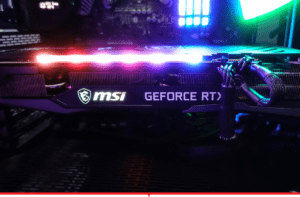
At this point, we would like to thank MSI for providing the review unit we used for this review. Especially now, when finding a GPU on the market (of that level) is harder than finding your perfect match in life. If you like MSI’s products, check out our latest review for their brand new MSI Clutch GM41 Wireless mouse.
